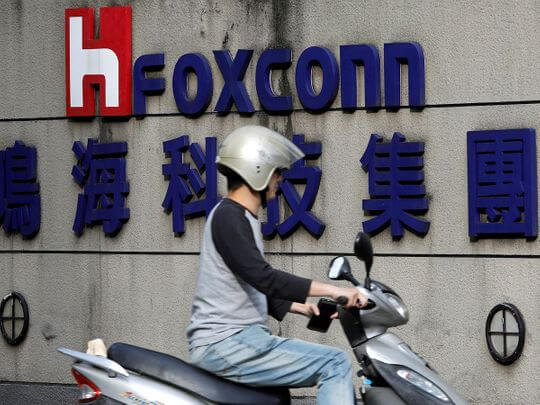World’s Largest iPhone Facility Locked Down
Under the country’s severe Covid regulations, Chinese officials have closed down an area in Zhengzhou city, which is home to the world’s largest iPhone facility.
The lockdown began on Wednesday and is scheduled to continue for seven days.
The decision might have an effect on the production of the new iPhone 14, which is manufactured at Foxconn’s facility in the city.
Individuals and businesses in China are still grappling with President Xi Jinping’s strict zero-Covid policy.
Local authorities said on Wednesday that the closure of the Zhengzhou Airport Economy Zone will begin immediately and conclude at midday local time on November 9th.
According to an official announcement on the WeChat social media network, public transportation has been banned and citizens have been urged to work from home.
Officials said they would “resolutely crack down on all kinds of violations of regulations”.
Zhengzhou is the capital of Henan province in central China and has a population of around 10 million people.
It reported 167 locally transmitted diseases in the seven days leading up to last Saturday, up from 97 the week before.
The closure comes at a critical juncture for Apple, following the release of the iPhone 14 and before the vital Christmas and New Year retail seasons.
The majority of Apple’s new phones are manufactured at Foxconn’s Zhengzhou facility, which employs over 200,000 people.
Foxconn announced on Tuesday that it has quadrupled its daily incentives at the production centre following a worker revolt during a Covid lockout.
The company said that incentives for assembly line workers will be increased to 400 yuan (£47.76) each day.
Foxconn also announced that employees who worked at the factory for more than 25 days per month would be eligible for a 5,000 yuan (£597.00) incentive, up from 1,500 yuan (£179.10).
It went on to say that individuals who put in “full effort” throughout November – without taking any break – might be rewarded a cumulative bonus of more than 15,000 yuan (£1791.00).
The incentives were part of an effort to “gradually resume orderly production” and to “thank our fellow employees’ persistence” according to the firm.
It has yet to offer an official tally of the number of persons infected by the coronavirus at the facility.
Last Wednesday, Foxconn said a “small number of employees” in Zhengzhou had been “affected by the pandemic” and were being provided with “material supplies, psychological comfort and responsive feedback”.
“At present, the epidemic prevention work in Zhengzhou is progressing steadily, and the impact on the group is controllable. The operating outlook for this quarter remains unchanged,” it added.
However, images uploaded on Chinese social media and by the BBC’s China reporter Stephen McDonell shows workers purportedly fleeing the premises to begin long walks back to their hometowns to escape being caught on public transportation.
One 22-year-old worker, surnamed Xia, told the Financial Times that the dormitories he and his co-workers were held in were in “total chaos”!
Workers reportedly stated that the region surrounding the facility had been sealed off for days, with Covid-positive employees isolated and tested on a regular basis in an attempt to limit the epidemic.
On Sunday Foxconn said it would no longer require workers at the plant to eat meals in their rooms “to improve the convenience and satisfaction of employees’ lives”.
The firm added that it was working with the local government to provide a “point-to-point orderly return service” for workers who wanted to go home.
It is unclear how employees will be allowed to return home now that the district has been locked down. Foxconn and Apple did not immediately reply to a request for comment from the BBC.
Coronavirus outbreaks have recently struck other Chinese businesses.
Earlier on Wednesday, Chinese electric car manufacturer Nio stated that manufacturing had been halted at two of its plants in the eastern city of Hefei. This week, the company said that it delivered over 10,000 automobiles in October.
The results were “constrained by operation challenges in our plants as well as supply chain volatilities due to the Covid-19 situations in certain regions in China” according to the company.
Xi Jinping, the most powerful Chinese leader since Mao Zedong is sticking to his staunch stance on his zero-Covid policy.
No, China is probably not headed for another famine like the one that killed millions as a result of Mao’s insistence on a disruptive bid for simultaneous industrialization and agriculture collectivisation between 1958 and 1962.
What’s comparable, though, are the mind-sets of Mao and Xi. Both set ostensible policy objectives — economic growth, public health — and called for party-led mass mobilisation to achieve them. For both, party-led mass mobilisation itself is the true point of the exercise.
Now, as then, the party will settle for nothing less than superhuman effort. “People must conquer nature,” Mao instructed during the Great Leap Forward. “Fighting against the epidemic is both a material struggle and a spiritual confrontation. It is a contest of strength and a contest of will,” an editorial on Xi’s coronavirus policy in People’s Daily recently said.
Mao proclaimed Chinese economic development would overtake that of Britain. Xi promises China will outperform Western countries at fighting the pandemic, without the help of their vaccines.
The ‘great’ economic, cultural, and spiritual ‘power’ contest between East and West continues…
online sources: washingtonpost.com, bbc.co.uk
All opinions and views expressed or suggested by the Digital Zeitgeist are not necessarily the same opinions and views held by or suggested by GPM-Invest plus any and all partners, affiliates, parties, or third parties of GPM-Invest. Any type of media distributed by GPM-Invest IS NOT financial advice. Please seek advice from a professional financial advisor

